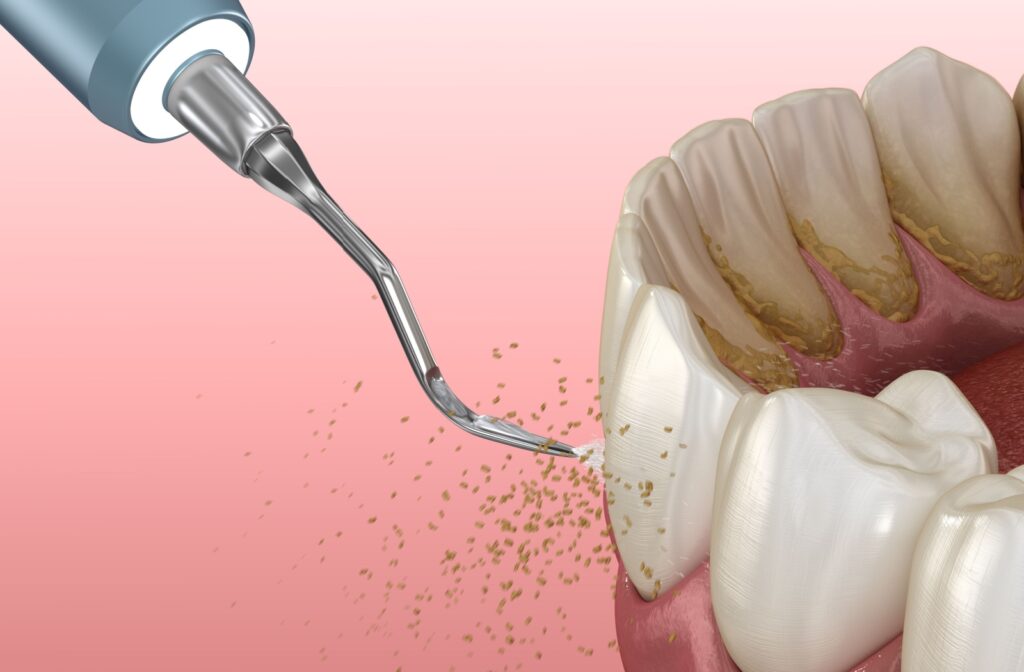Good oral health starts with more than just daily brushing and flossing. During your regular dental cleaning, one of the most valuable steps is dental scaling, which carefully removes buildup from the spaces between your teeth and gums.
You may feel some light pressure or sensitivity, but the process is gentle and important for preventive care. By clearing away the plaque and tartar below the gumline, dental scaling reduces your risk of gum disease and supports a strong foundation for your long-term oral health. It’s a proactive way to keep your smile healthy, fresh, and resilient for years to come.
Why Dental Scaling is Essential for Your Oral Health
Dental scaling is part of a routine dental cleaning that focuses on removing plaque, bacteria, and tartar (hardened plaque) from your teeth and gums. This procedure is one of the key reasons we emphasize daily brushing and flossing.
Leftover plaque eventually hardens into tartar, which can only be removed through dental scaling. Because tartar buildup can lead to gum disease, scaling is a vital part of preventive care. Beyond keeping your smile clean, it plays an important role in your overall health:
- Prevents gum disease: Scaling removes tartar and bacteria that accumulate below the gumline, lowering the risk of gingivitis and periodontitis.
- Freshens breath: Bacteria trapped beneath the gumline can cause persistent bad breath. Scaling helps eliminate the source.
- Protects your smile: Advanced gum disease is a leading cause of tooth loss. Treating tartar buildup early helps prevent gum recession, loose teeth, or tooth loss.
- Supports overall health: Poor oral health has been linked to conditions such as heart disease and diabetes. Keeping your gums healthy can support your overall wellness.
As a general rule, it is recommended to have a routine cleaning and exam every 6 months. These visits not only keep your teeth and gums healthy, but they also allow us to identify and manage concerns like gum disease early.
In other words, addressing small issues before they grow into bigger problems can help protect your long-term oral health. Consider your routine cleanings and exams your first line of defence.
What to Expect During Dental Scaling
Dental scaling is a routine part of every dental cleaning and exam, but it’s important you feel comfortable throughout the process.
The Procedure
The procedure begins by examining your teeth and gums, often using a small mirror to check for signs of gum inflammation or tartar buildup.
Next, using specialized tools—such as a scaler or ultrasonic device—your hygienist will gently remove plaque, bacteria, and tartar from your teeth, focusing especially on areas below the gumline. Any debris is rinsed away with water.
After scaling, your hygienist may polish your teeth to smooth the surfaces, remove minor stains, and help prevent future plaque buildup.
Scaling also disrupts the cycle of gum disease by removing tartar and reducing the depth of gum pockets, allowing your gums to heal and reattach more firmly to your teeth.
What Does Dental Scaling Feel Like?
The sensation varies depending on the extent of tartar buildup and your gum sensitivity. You may feel some pressure or light scraping, but the procedure is generally not painful. If you have sensitive teeth or gums, we can use a local anesthetic to keep you comfortable.
It’s normal to experience mild tenderness around your gums afterward, but this usually subsides within a day or two.

How to Care for Your Teeth After Dental Scaling
Proper after-care helps your gums heal, so you get the long-term benefits of dental scaling. While your mouth may feel a little sensitive at first, staying gentle and consistent with your oral hygiene will make recovery smooth and effective.
Immediate After-Care Tips
- Expect mild sensitivity: Some gum tenderness or slight tooth sensitivity is normal. Over-the-counter pain relievers or a warm saltwater rinse can help ease discomfort.
- Avoid certain foods: Skip hot, cold, or spicy foods for the first day or two, as your teeth and gums may be more sensitive.
- Brush and floss gently: Continue your daily routine but be extra gentle around the gums. Use a soft-bristled toothbrush to avoid irritation.
- Stay hydrated: Drinking water throughout the day helps flush bacteria and supports healing.
Long-Term Maintenance
After the initial healing, keeping up with healthy habits and regular checkups is recommended to maintain your results:
- Brush twice daily: Focus on proper technique, and consider an electric toothbrush for a more thorough clean.
- Floss daily: Flossing removes plaque between teeth where your toothbrush can’t reach, reducing tartar buildup.
- Use an antimicrobial mouthwash: A rinse can lower bacteria levels and support gum health.
- Visit your dentist regularly: Routine check-ups and cleanings help catch issues early and keep your oral health on track.
Prevent Gum Disease with Regular Scaling
Protecting your smile starts with consistent care, and dental scaling is one of the most effective steps you can take. By addressing plaque and tartar buildup early, you can lower your risk of gum disease, support healthier gums, and enjoy the benefits of a cleaner, fresher smile.At Montgomery Dental Centre, our team is committed to making every visit comfortable, informative, and tailored to your needs. Whether it’s your first cleaning or part of your ongoing care, we’re here to support your long-term oral health journey. Contact us to book an appointment today!




